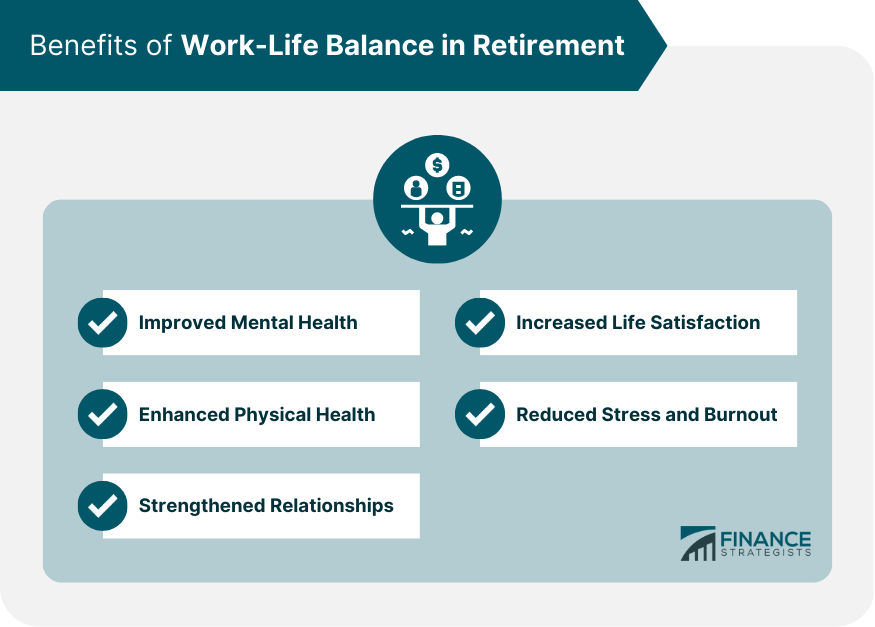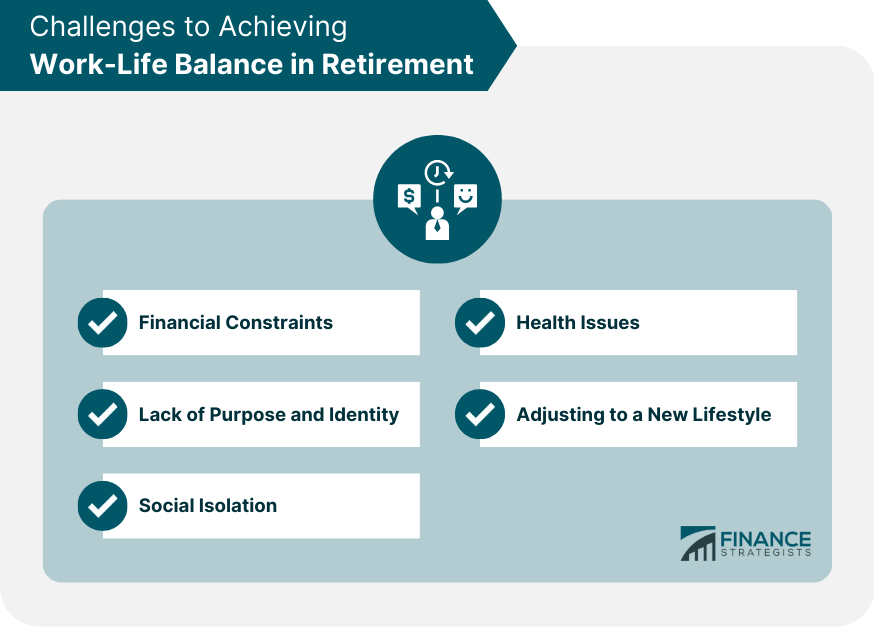Work-life balance is a concept that has gained significant attention in recent years, as individuals seek to find a harmonious equilibrium between their professional responsibilities and their personal lives. While the concept is often associated with individuals in the workforce, it is equally relevant to retirees. Retirement is a significant life transition that brings about a new set of challenges and opportunities, and finding a sense of balance is crucial to enjoying a fulfilling and meaningful retirement. A well-balanced retirement lifestyle can significantly improve mental health by reducing stress, anxiety, and depression. Engaging in activities and maintaining social connections can provide retirees with a sense of accomplishment and belonging, thus enhancing their overall well-being. Staying physically active and maintaining a healthy lifestyle can improve retirees' overall health and reduce the risk of chronic diseases. Pursuing recreational activities and hobbies can also contribute to improved work-life balance, leading to better physical health. Work-life balance in retirement can foster stronger relationships with family and friends. Retirees who dedicate time to nurturing relationships can experience increased emotional support and social connections. Achieving work-life balance in retirement can lead to a higher sense of life satisfaction. Retirees who engage in meaningful activities, maintain strong social connections, and have financial stability tend to be more content with their lives. Work-life balance in retirement helps reduce stress and prevent burnout by allowing retirees to establish a balance between leisure, social activities, and personal interests. Limited financial resources can hinder retirees' ability to maintain a balanced lifestyle. Proper financial planning is essential for ensuring a stable retirement that supports work-life balance. Retirees often face challenges adjusting to a life without work, which can lead to feelings of purposelessness and loss of identity. Developing new interests and goals can help retirees maintain a sense of purpose in retirement. Retirement can lead to social isolation if not properly managed. Staying connected with friends, family, and community is crucial for maintaining work-life balance in retirement. Health problems can limit retirees' ability to engage in activities and maintain work-life balance. Managing health issues through regular checkups and a healthy lifestyle is essential for maintaining work-life balance in retirement. Transitioning from a working lifestyle to retirement can be challenging. Retirees need to adapt to their new routine and develop strategies for maintaining work-life balance. Income Replacement Ratio: Determine the percentage of pre-retirement income required for a comfortable retirement. Expected Expenses: Estimate the expenses in retirement, including essential and discretionary expenses. Inflation Considerations: Account for the impact of inflation on retirement savings and expenses. Essential Expenses: Budget for necessities such as housing, food, utilities, and health care. Discretionary Expenses: Allocate funds for leisure activities, hobbies, and travel. Health Care Costs: Plan for potential health care expenses, including insurance premiums, out-of-pocket costs, and long-term care. Social Security: Understand and maximize Social Security benefits. Pensions: Evaluate pension options and optimize payouts. Retirement Savings Accounts: Utilize tax-advantaged accounts such as 401(k)s, IRAs, and Roth IRAs. Part-Time Work or Consulting: Consider part-time work or consulting opportunities to supplement retirement income. Long-Term Care Insurance: Purchase long-term care insurance to cover potential care expenses in retirement. 2. Emergency Funds: Establish an emergency fund to cover unexpected expenses and financial setbacks. Estate Planning: Develop an estate plan to ensure the proper distribution of assets and minimize potential tax burdens. Creating a daily routine in retirement can provide structure and a sense of purpose. Incorporate activities such as exercise, social events, and hobbies to establish a well-rounded routine. Participate in leisure activities and social events to stay connected and maintain work-life balance. This can include joining clubs, attending community events, or participating in group activities. Explore personal interests and hobbies to fill the time previously occupied by work. This can provide a sense of accomplishment and contribute to work-life balance in retirement. Prioritize physical activity and a healthy lifestyle to support overall well-being and work-life balance. This can include regular exercise, a balanced diet, and proper sleep habits. Pursue lifelong learning opportunities to stay engaged and intellectually stimulated. Consider taking classes, attending workshops, or joining educational groups. Engage in volunteering and community service to contribute to society, stay connected, and maintain work-life balance in retirement. Understand and accept that retirement may not always align with preconceived notions. Be open to adapting to new circumstances and adjusting expectations accordingly. Develop a sense of purpose in retirement by setting personal goals, pursuing interests, and engaging in meaningful activities. Create a support network consisting of friends, family, and community members to provide emotional support and camaraderie during retirement. Be proactive in addressing potential mental health concerns by seeking professional help and utilizing available resources to maintain emotional well-being. Achieving work-life balance in retirement is crucial for overall well-being, mental and physical health, and life satisfaction. To successfully maintain work-life balance, retirees must address challenges such as financial constraints, lack of purpose, social isolation, health issues, and adapting to a new lifestyle. Effective financial planning, including establishing financial goals, creating a retirement budget, diversifying income sources, and managing risks, plays a vital role in supporting work-life balance in retirement. Additionally, retirees can benefit from establishing a routine, engaging in leisure and social activities, pursuing personal interests, staying physically active, focusing on lifelong learning, and volunteering to maintain a balanced lifestyle. By understanding and managing emotional and psychological aspects of retirement, retirees can better navigate this new phase of life. Learning from case studies and examples of successful work-life balance in retirement can also provide valuable insights and inspiration. Overall, with proactive planning, goal-setting, and adaptation to new circumstances, retirees can enjoy a fulfilling and balanced retirement.Work-Life Balance in Retirement Definition
Benefits of Work-Life Balance in Retirement

Improved Mental Health
Enhanced Physical Health
Strengthened Relationships
Increased Life Satisfaction
Reduced Stress and Burnout
Challenges to Achieving Work-Life Balance in Retirement

Financial Constraints
Lack of Purpose and Identity
Social Isolation
Health Issues
Adjusting to a New Lifestyle
Financial Planning for Work-Life Balance in Retirement
Establishing Financial Goals
Creating a Retirement Budget
Diversifying Income Sources
Managing Risks and Unexpected Events
Strategies for Maintaining Work-Life Balance in Retirement
Establishing a Routine
Engaging in Leisure and Social Activities
Pursuing Personal Interests and Hobbies
Staying Physically Active and Maintaining a Healthy Lifestyle
Continuing Education and Skill Development
Volunteering and Community Involvement
Emotional and Psychological Aspects of Work-Life Balance in Retirement
Managing Expectations
Cultivating a Sense of Purpose
Building a Strong Support Network
Addressing Potential Mental Health Concerns
Conclusion
Work-Life Balance in Retirement FAQs
Work-life balance in retirement refers to the equilibrium between an individual's personal life and their post-work life. It involves finding a balance between leisure activities, family commitments, and other personal pursuits while still engaging in meaningful work or volunteer activities.
Work-life balance in retirement is essential for maintaining a sense of purpose, fulfillment, and overall well-being. It allows retirees to pursue their interests and passions outside of work while also maintaining a healthy social life and fulfilling personal obligations.
Retirees can achieve work-life balance by setting priorities, establishing boundaries, and creating a schedule that incorporates both work and personal activities. This may include taking up a hobby or volunteer work, spending time with family and friends, and engaging in physical exercise or other wellness activities.
The benefits of achieving work-life balance in retirement include improved mental and physical health, reduced stress and anxiety, greater happiness and life satisfaction, and a more fulfilling retirement experience overall.
Yes, work-life balance in retirement can differ from traditional work-life balance as retirees often have more freedom to pursue personal interests and activities. They may also have more time to devote to family and community involvement, as well as travel and leisure pursuits.
True Tamplin is a published author, public speaker, CEO of UpDigital, and founder of Finance Strategists.
True is a Certified Educator in Personal Finance (CEPF®), author of The Handy Financial Ratios Guide, a member of the Society for Advancing Business Editing and Writing, contributes to his financial education site, Finance Strategists, and has spoken to various financial communities such as the CFA Institute, as well as university students like his Alma mater, Biola University, where he received a bachelor of science in business and data analytics.
To learn more about True, visit his personal website or view his author profiles on Amazon, Nasdaq and Forbes.











